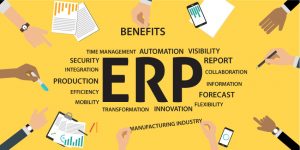ERP Issues – Despite ERP’s many advantages, this complex technology poses many challenges to firms. Businesses may hesitate to implement an ERP in their organization. But, putting the necessary safeguards in place will help you avoid typical ERP system problems and ensure your ERP system is successfully configured.
Today, we’ll review a few typical issues businesses face after deploying an erp software and how to avoid them as you begin the ERP decision and installation process.
Keep your ERP system in good shape!
1: Relatively low benefits realisation
When their ERP system is up and running, some businesses are startled that it does not provide all of the expected operational benefits. This is frequently the consequence of a technology-focused worldview. While your IT team will be critical throughout the implementation, they should not be in charge of the project. If the system does not fit your business goals, it may be challenging to ensure it does. When you prioritise the business as well as the technical aspects of the project, you may select and create a solution that answers your most pressing business demands.
2: A lack of reliability in data
ERP systems operate on company data. That data is untrustworthy or erroneous and may cause havoc on your entire platform. It is critical to adequately cleanse data as it is transferred from legacy systems to new applications. Otherwise, it may impact the operability and utility of your new solution. As a result, plan to devote a significant amount of time to your ERP implementation’s data testing and migration phases. Otherwise, the ultimate product may not offer the expected efficiencies.
Build strategies, build confidence, and build your business with Connected IT Consulting!
3: Cost overruns and timeline delays
Teams often begin with false expectations when ERP initiatives take far too long and cost too much. Avoid vendors who promise lightning-fast projects and costs that are so low that they raise eyebrows. Consider the project from all perspectives, and account for projected and unexpected expenditures. Think carefully about any ERP system customisations you’re planning. While most ERP packages cannot be used out of the box, major adjustments can reduce your budget and cause your project to go behind schedule.
4: Inefficient use of the system
You might invest in one of the best ERP systems with all the features your company needs. Conversely, if your employees do not use it appropriately, it may become “shelfware.” When staff are kept in the dark about the project, they are more inclined to fight it and propagate mistrust around the organisation. Early in the project, focusing on change management can assist your workforce in comprehending and embracing the changes. Make frequent updates about the new ERP software available, and clarify how it will make their tasks easier.
5: Gaps in functional capability
When you put time, money, and effort into an ERP deployment, you want it to provide the necessary capabilities. It’s usual for merchants to offer a slew of features but neglect to clarify that they’re not yet available. When assessing ERP companies, consider thoroughly investigating their claims, particularly those concerning functionality. If the job description appears too ambiguous, think carefully before signing on the dotted line. As soon as the system is live, it must be completely functional.
To conclude,
ERP software services, like other enterprise solutions, can have problems. However, if you follow best practices for ERP selection and implementation, you can avoid these issues.
Our ERP consulting firm, Connected IT Consulting, can assist you with every project milestone to help you prevent ERP failure. To connect with our erp consultants immediately, kindly reach out to us at 015415471 or email us at hello@connectedit.consulting.
Related Links
ERP Project Management
Business Process mapping
Small Business ERP
ERP Consulting



